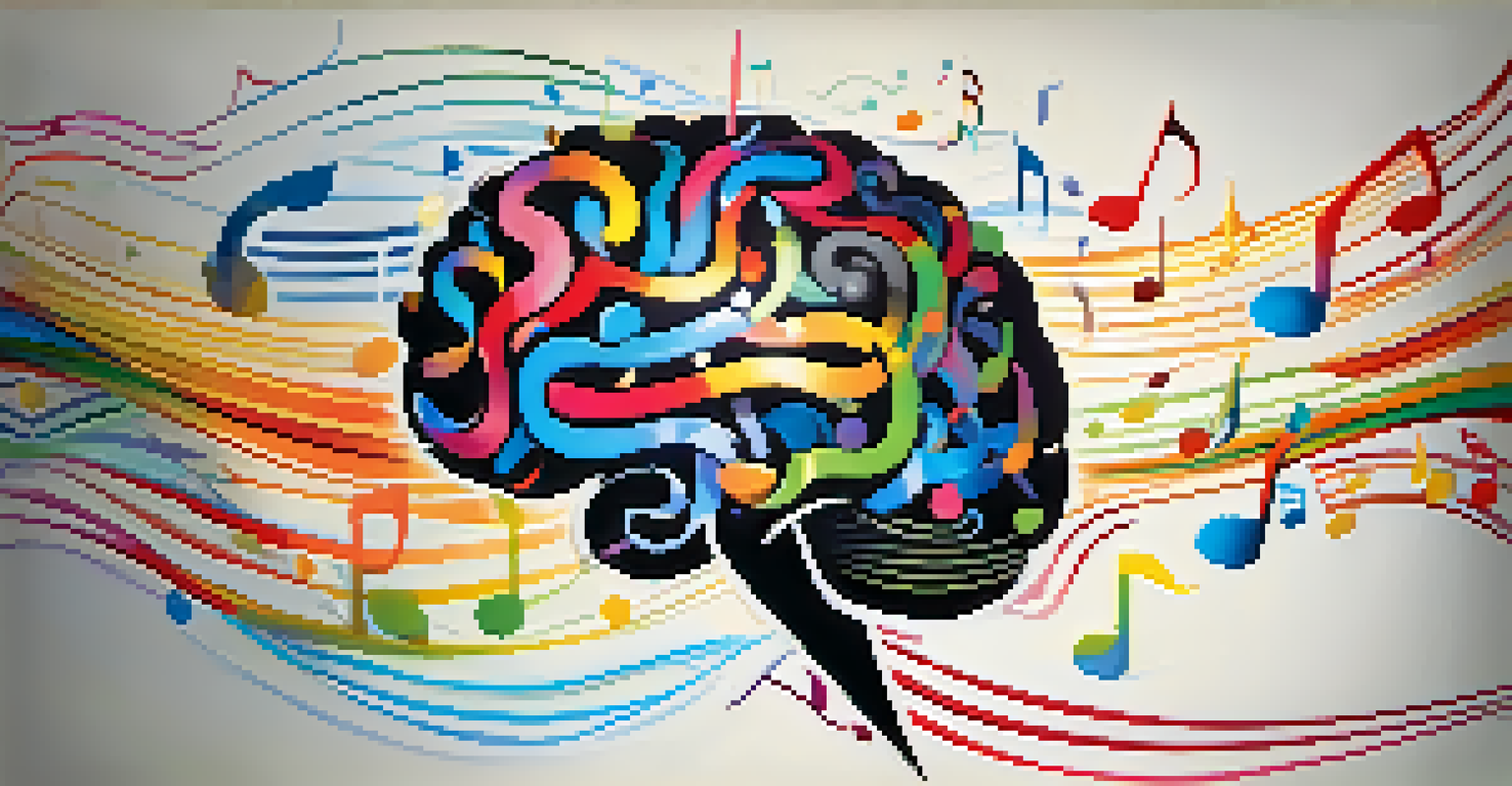How Music Affects Cognitive Health and Brain Function

The Connection Between Music and the Brain
Music has a unique ability to engage various areas of the brain, stimulating both emotional and cognitive responses. When we listen to music, multiple brain regions light up, from those involved in processing sound to areas that manage memory and emotion. This multi-faceted engagement hints at the powerful role music plays in our cognitive processes.
Music can change the world because it can change people.
For example, a simple melody can evoke cherished memories, showcasing how music can act as a time capsule for our experiences. This connection is not just anecdotal; studies have shown that listening to music can improve memory recall in certain contexts, emphasizing its potential as a cognitive enhancer. Understanding this connection is crucial for leveraging music in our daily lives.
Moreover, the rhythmic elements of music can stimulate brainwaves, creating a synchronous pattern that promotes focus and clarity. Whether it’s a soothing classical piece or an upbeat pop song, the way music interacts with our brain can lead to improved concentration and cognitive health.
Music as a Tool for Cognitive Development
Engaging with music, either by listening or playing an instrument, can significantly boost cognitive development, especially in children. Research indicates that children exposed to music education show enhanced verbal skills, memory, and even mathematical abilities. This suggests that music is more than just entertainment; it’s a powerful educational tool.

For instance, learning to play an instrument requires coordination, timing, and discipline, all of which contribute to cognitive growth. As children practice regularly, they develop critical thinking skills and improve their ability to process information. This creates a solid foundation that supports various aspects of learning.
Furthermore, group music activities, like orchestras or choirs, foster social skills and teamwork. These experiences not only enrich cognitive abilities but also build relationships, making music a holistic approach to development that benefits both the mind and social interactions.
The Role of Music in Older Adults' Cognitive Health
For older adults, music can play a vital role in maintaining cognitive health and enhancing quality of life. Engaging with music has been shown to reduce the risk of cognitive decline, including conditions like dementia and Alzheimer's disease. This highlights music's potential as a preventive measure in aging populations.
The music is not in the notes, but in the silence between.
Listening to familiar songs can trigger memories and emotions, helping to keep the mind active and engaged. In fact, music therapy is increasingly being used in clinical settings to stimulate memory recall and emotional well-being among elderly patients. This therapeutic approach underscores how music can serve as a bridge to the past.
Moreover, group music activities in senior centers provide social interaction, which is crucial for mental health. The joy of singing or playing together not only enhances cognitive function but also combats feelings of loneliness and isolation, creating a richer, more fulfilling life.
How Music Affects Mood and Mental Well-Being
Music has a profound effect on our mood, often influencing emotions in ways we might not even realize. Listening to uplifting music can elevate our spirits, while calming melodies can help reduce stress and anxiety. This emotional regulation is essential for overall mental well-being, making music a valuable tool in managing everyday life.
For example, think about how you feel when your favorite song comes on the radio; it can instantly transport you to a happier place. This immediate mood enhancement is linked to the release of dopamine, a neurotransmitter associated with pleasure and reward. Such reactions reveal music's power in shaping our emotional landscape.
Additionally, music therapy is increasingly being recognized as an effective treatment for mental health conditions. Techniques involving music can provide an outlet for expression and healing, illustrating how sound can serve as both a balm for the soul and a catalyst for cognitive growth.
The Science Behind Music and Brain Function
Research into how music affects the brain is rapidly growing, revealing fascinating insights into its impact on brain function. Studies employing neuroimaging techniques show that listening to music activates areas of the brain related to memory, attention, and even movement. This scientific backing strengthens the argument for music's role in cognitive health.
For instance, researchers have found that musicians often have increased grey matter volume in areas of the brain associated with auditory processing, memory, and motor control. This suggests that regular engagement with music can lead to structural brain changes, enhancing cognitive abilities. Such findings provide a compelling case for incorporating music into our routines.
Moreover, the effects of music on brain function extend beyond mere enjoyment; they can influence learning and retention. Whether through classical music providing a backdrop for studying or rhythmic beats aiding memorization, the science indicates that music can enhance our cognitive capabilities in various ways.
Music and Neuroplasticity: Rewiring the Brain
Neuroplasticity refers to the brain's ability to reorganize itself by forming new neural connections throughout life. Engaging with music is a fascinating way to promote neuroplasticity, as it challenges the brain to adapt and learn. This adaptability is especially beneficial for cognitive health, particularly as we age.
For example, learning a new instrument or even trying to master a song can stimulate the brain, encouraging it to forge new pathways. These activities not only enhance memory and learning but also contribute to overall brain resilience. This means that even if cognitive decline begins, music can help mitigate its effects.
Moreover, the emotional responses triggered by music can further encourage neuroplasticity. The joy and pleasure derived from music can boost motivation and willingness to engage in cognitive challenges, creating a positive feedback loop that promotes ongoing brain health and function.
Practical Ways to Incorporate Music into Daily Life
Incorporating music into your daily routine doesn't have to be complex; even small changes can make a significant difference. Start by creating playlists that align with your mood or tasks—upbeat tunes for a workout, calming melodies for relaxation, or even classical music for focused study sessions. These intentional choices can enhance your cognitive experience throughout the day.
Additionally, consider engaging in musical activities, such as joining a choir or taking up an instrument. These pursuits encourage both social interaction and cognitive engagement, making them doubly beneficial for mental health. Even casual jam sessions with friends can provide a fun outlet for creativity and connection.

Lastly, don’t underestimate the power of background music. Whether it's playing during meals, work, or leisure activities, the right tunes can create a more enjoyable atmosphere that stimulates cognitive function. By weaving music into the fabric of your daily life, you can harness its many benefits for your brain and overall well-being.